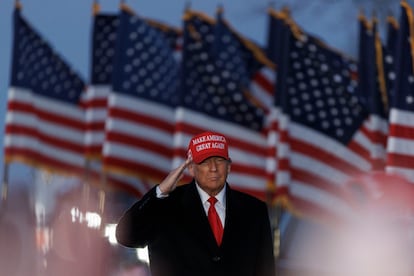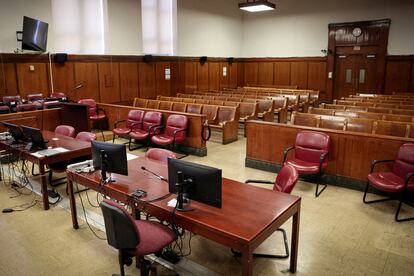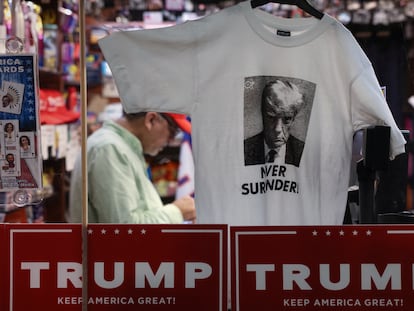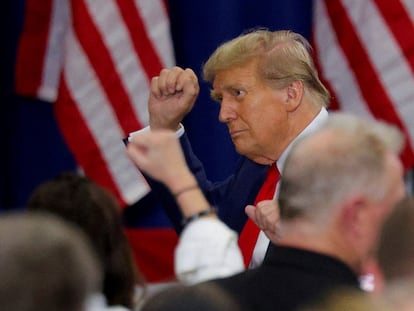The moment of truth for Donald Trump: First criminal trial against former president begins in New York
The unprecedented event will begin on Monday with the selection of the 12-member jury and is set to last between six and eight weeks


Of the 1.4 million adults who live in Manhattan, 12 are about to become the first Americans to try a former president of the United States. The criminal trial against Donald Trump over alleged hush money paid to a porn actress will fill the city with a mix of dystopian elements and others more fitting of a Hollywood blockbuster. There will be a huge deployment of security forces and secret agents, a caravan of cars with tinted windows, two no-go zones around the Manhattan Criminal Court and Trump Tower — where the former president will stay during the trial — and Orwellian surveillance of social media in an effort to detect any threat.
Trump has vigorously tried to postpone the four criminal trials against him until after the November elections, so that, if elected, he could shelve the cases. But he has not succeeded in the Stormy Daniels case in New York, in which he is charged with 34 Class E felony counts — the lowest level felony in New York — for falsifying business records as part of an alleged effort to cover up hush money paid to Daniels in 2016. The payoff was allegedly made to ensure that the porn actress’ claims that she had an extramarital affair with Trump did not hurt his presidential campaign. The payment, in fact, was recorded as “legal expenses.” Trump — who pleaded not guilty to the charges — will be in the courtroom from Monday for a trial that is expected to last between six and eight weeks, with daily hearings except for Wednesday recesses.
Trump will be protected from public view, as New York State laws prohibit trials from being televised, but the swarm of cameras at the entrance to the court and in the hallway leading to the courtroom will give him a priceless megaphone in the middle of the election campaign. The voice of Trump the candidate and Trump the accused will merge into one: that of a victim of political persecution. For months, that’s how he has been trying to present himself before public opinion, especially his supporters. Playing the victim worked well for Trump in the primaries and also garnered financial results, with the Trump campaign raising large amounts of money after each of his indictments. But the exorbitant legal expenses involved in facing four criminal trials and two other civil proceedings have drained the coffers of his campaign. Indeed, some Republicans believe transferring funds to support Trump the candidate to help pay the legal fees of Trump the accused is unjustifiable.
For jury selection — which is expected to last one to two weeks, but could be delayed due to objections from prosecutors and the defense — several hundred Manhattan residents will be summoned. It is a critical period of the process: both the prosecution and the defense will try to detect hidden prejudices, with the help of a 42-question questionnaire. In the selection, the candidates will not be questioned about their opinions or political affiliation. Instead, there are questions about their sources of information — the questionnaire includes 20 sources, including conventional media, social media and the option “I do not follow the news” — if they have worked for Trump, or have attended any of his rallies, if they have ever been members of the Proud Boys, the so-called “Trump army,” which took part in the assault on the Capitol on 2021, and if they have ever been a part of the QAnon conspiracy movement, which spread anti-establishment fake news to help boost Trump at the polls. Prospective jurors will also be asked if they have any feelings or opinions about how the Republican candidate is being treated in the case, a slippery question regardless of the answer.
The judge overseeing the case, Juan Merchan, of Colombian origin, issued a gag order, prohibiting the former president from attacking prosecutors, witnesses, court staff and the judge’s own relatives. The move was taken after the business tycoon posted a series of angry messages on his Truth Social platform. It is not the first time that a judge has tried to curb Trump’s tirades, but previous cases confirm that it is almost impossible to restrict the former president’s speech: he lashes out even if it means risking being held in contempt.
In the civil trial for business fraud, for which he has been ordered to pay $464 million, the judge even had to ask the lawyers to control their distraught client. And the Stormy Daniels case, filled with salacious details, lends itself to heated exchanges. Judge Merchan has so far kept the defense at bay.

Trump has announced his intention to testify — he could decline on the advice of his lawyers so as not to incriminate himself — which would mark another first in a trial full of unprecedented details. Many legal experts doubt that Trump will risk having to answer a series of very personal questions under oath, and the risk of committing perjury. When asked about the trial at last week’s press conference with Republican House Speaker Mike Johnson, Trump said: “Yes, I would testify, absolutely.” But, given his unpredictable nature, he may change his mind.
Trump’s lawyers are hoping for an acquittal or for a juror to abstain — a verdict requires a unanimous vote — which could lead to a mistrial. If the former president is convicted, each count carries a maximum prison sentence of four years.
The Manhattan trial may be Trump’s only appearance in the dock before the November election. Two federal cases, as well as another state case in Georgia, could be postponed until after the vote. However, the first-ever criminal trial of a former president represents the ultimate collision between Trump’s legal ordeal and his presidential ambitions. The trial will change the presidential campaign in an unprecedented way. The defendant will be a presidential candidate on Wednesdays and weekends. But the fact that he has moved part of his campaign team to New York suggests that he will take advantage of every court appearance to deliver his usual fiery diatribes. If, in addition, he raises more money for his ailing campaign, he could in fact profit from the trial.
Sign up for our weekly newsletter to get more English-language news coverage from EL PAÍS USA Edition









































